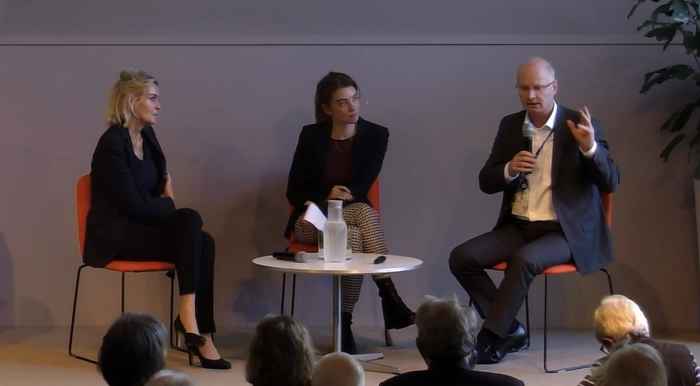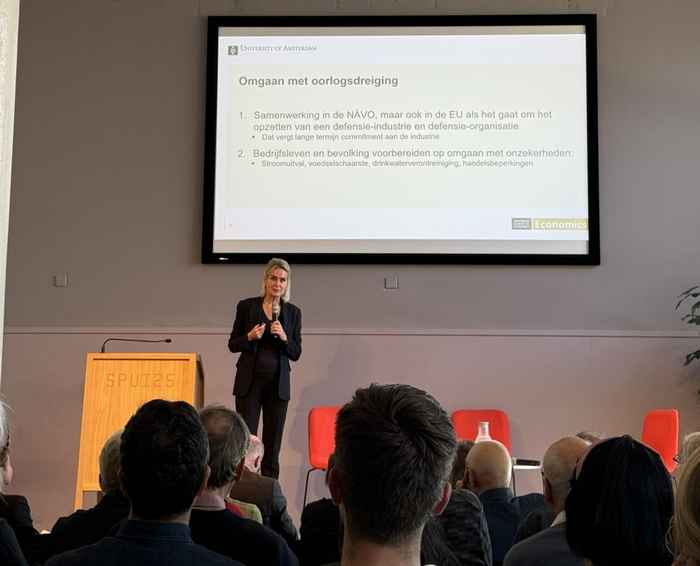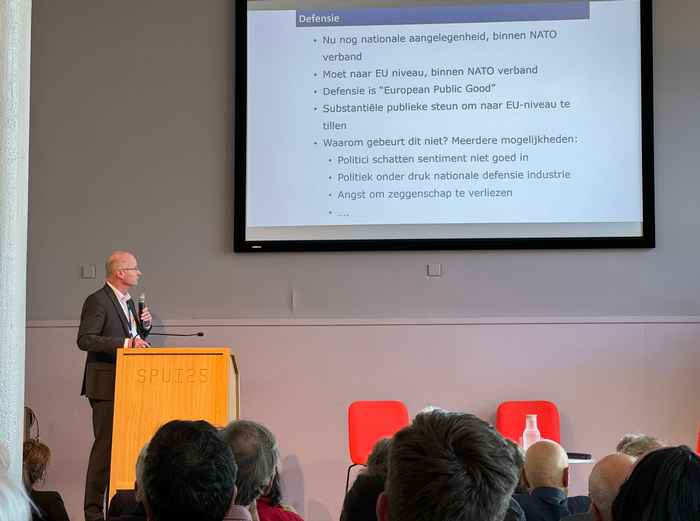Expect the unexpected!
What is the price we pay for our security?
26 juni 2024

The war between Russia and Ukraine and the European support programme were the focus of this event, which was organised by the UvA Economics and Business. The countries supporting Ukraine are not physically shooting bullets at Russia or sending troops. Even so, they are waging a war of economic attrition against Russia by imposing harsh sanctions. But should NATO, the EU and the Netherlands now also make strategic choices about their defence spending? Economists Barbara Baarsma and Roel Beetsma, the Dean of UvA Economics and Business, go on to discuss this pressing question.

Increasing uncertainty
‘The world is becoming increasingly uncertain’, says Barbara Beetsma as she displays a graph showing global defence spending. The ‘World Uncertainty Index’, which measures global uncertainty, indicates that factors like the coronavirus pandemic, the war in Ukraine and the conflict between Hamas and Israel are causing a surge in uncertainty. ‘One thing is clear, and that is that we should expect the unexpected’, Baarsma argues.
Defence expenditure, which is a reliable indicator of these uncertainties, is rocketing. 'Military spending hit a new record of 2.433 billion dollars last year. That is the largest increase since 2009’, Baarsma points out. These figures unequivocally show that uncertainties and tensions are fuelling increasing investment in defence.
Preparing for uncertainty
Next, Baarsma zooms in on Russia. Let's suppose that Russia becomes a war economy and spends 50% of GDP on defence. By collaborating effectively and investing intelligently in defence, the European Union could in fact match this financially. ‘After all, the Russian economy is ‘only’ roughly the size of the Belgian and Dutch economies combined’, Baarsma clarifies. 'So if the EU collaborates smoothly, it can access financial resources of a much greater magnitude to strengthen defence if that were ever necessary.'
Upping defence expenditure is just one aspect of the strategic adjustment that is needed to prepare us for increasing uncertainties. ‘Collaboration between NATO and the EU is also very important, and preparing the population for possible disaster scenarios such as power outages and food shortages is urgently needed.’ Baarsma also stresses that trade wars should be avoided to prevent further tensions. ‘Our role as the European Union is exactly the opposite; we should set up trade agreements and continue to trade with other countries’, she advises.

More efficient collaboration in Europe
But how can we collaborate better from a European perspective, and do Europeans actually support this? Roel Beetsma: ‘Currently, defence policy within the EU is mainly a national matter, with little delegation at EU level. If we purchased and coordinated our defence equipment jointly, we could do things 50 percent more efficiently’, he states. This would not only prevent duplication, but also ensure better coordination between the armed forces of different countries.
Beetsma points out that there are already partnerships within the EU, such as joint research and development projects via the European Defence Fund. But he also stresses that there is still much room for improvement and that the level of support among Europeans is strong according to the Eurobarometer. ‘The number of Europeans who favour a common defence policy is high at 75 percent’, he says.
National Sovereignty
Despite the logic behind these clear advantages, national sovereignty remains a sensitive issue. ‘European countries could, in a sense, operate as a single country within NATO’, Beetsma says. However, he suspects that strong ties between national governments and the defence industry, and the fear of losing national influence, are major obstacles.
In his closing words, Beetsma stresses the need for further research and discussion, against the backdrop of global uncertainty: ‘Should we start investing in the arms industry again and should we reintroduce conscription?’ He feels that these are questions we need to ask in the light of the current political conflicts and tensions.
Long-term collaboration
After the speeches, a brief discussion ensues with the audience and a clear theme emerges: there is an overriding need for a long-term policy and good collaboration within Europe. This focus on collaboration, which includes the economy and the environment as well as defence, highlights the challenges facing the Netherlands and Europe. There is growing awareness that investments in defence not only increase military strength, but also have economic and environmental impacts. It is time to look beyond national interests and pursue a common European approach. Long-term planning is crucial in this approach in order to achieve sustainable security.